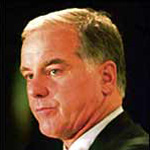By Jay Lyman
Published April 4th 2006 in NewsForge
Can running free software with an old Diebold voting machine yield valid, verifiable election results and save a city millions by avoiding a runoff election? It did for Burlington, Vermont.
The Northeast city last month combined a proprietary Diebold AccuVote machine and freely available ChoicePlus Pro code to produce publicly available election results. An instant runoff voting (IRV) program allowed city voters to pick a mayor in one trip to the ballot box, without the expensive runoff election often required in local, multi-candidate races where no candidate gets a majority on the first ballot.
There are some catches when it comes to calling the ChoicePlus software free or open source. First of all, the software is not licensed by an OSI-approved or other open source license, concedes Steve Willett, who is now the only person behind Voting Solutions. However, Willett owns the copyright on the software, and provides it free of charge for anyone to download and use.
The reason ChoicePlus Pro is not licensed as open source software is that it contains a key library that is a Borland proprietary technology. Willett is authorized under his license with Borland to distribute the ChoicePlus Pro software with the library, he says, but he would prefer an open source replacement. "It's our intention that it be a completely open source project."
Today ChoicePlus runs only on Windows, officially, but Willett said he has successfully, albeit awkwardly, installed it on Linux and Mac operating systems. "We would like to move to Linux," he says.
The code -- developed on JBuilder and now delivered as a Windows installation executable -- has been the basis for city council and school board elections in Cambridge, Mass., New York City, and most recently, Burlington, which is the newest of "a small number of clients," according to Willett. He and two partners, one of whom wrote the ChoicePlus Pro code, decided last September to make their software freely viewable and available for anyone. The response, however, was disappointing, Willett says.
"The issue is there is no driving force." Willett says the software is ahead of its market, and stresses ChoicePlus -- also used by foreign governments, the Academy Awards, and the high-IQ group Mensa -- is limited in the kind of elections it can provide.
"All we are is a back end tallying machine," he says. "But for those who need it, it's critical."
Willett no longer charges customers such as Cambridge -- which paid $15,000 plus per-use fees -- for the software, but he does charge for consulting and code modification, he says.
Success in Vermont
Voting consultants say the use of an older Diebold system -- not necessarily desirable, but nonetheless applicable to voting districts across the country -- combined with a more transparent tallying method is a major step forward.
"The first half is proprietary," says Elections Solutions consultant Caleb Kleppner. "The second half is transparent."
Kleppner explains that unlike Cambridge, Burlington went ahead and posted the actual ballot images. He says while ballots may have been cast with a closed Diebold system, the transparent tallying allowed for a verifiable result that could be compared to paper ballots, which have long been collected in the city's elections.
"You can look at the data and manually compare it," he says. "Here's the data. Here's the outcome. You can check for yourself to see the validity."
Kleppner also stressed that the availability of the code, which was also posted by Burlington, bolstered public trust in the election.
"With all this proprietary software, no member of the public can look at the code," he says. "They can't check that that was the code that was actually on the machine."
However, the cost-savings of the instant runoff voting and the transparency afforded by the use of ChoicePlus Pro makes the Burlington election a promising precedent, Kleppner says, adding that government support and vendor lock-in are still challenges.
"There's growing interest in IRV, and there's clearly lots of interest in getting open source software in election systems, or at least public review."
Fair Vote spokesperson Ryan O'Donnell, whose organization promotes fair voting and higher turnout, hails the Burlington IRV election as a solution to both the spoiler effect, when the vote is fragmented by many choices, and the expense of a second runoff election in which turnout typically plummets.
"The challenge with the machines is you have to have a machine that accommodates this method of voting," he O'Donnell says. "We needed to be able to count votes with these rankings taken into account."
While other voting jurisdictions might consider the somewhat odd combination of Diebold machines and ChoicePlus tallying that was viewed as successful, Willett says the Borland library, used for a pop-up triggered in the event of a tie, must be rewritten for the solution to be completely open source. "It's a matter of finding time to go in and replace that library," he says.
 On March 16th, Former Vermont Governor and Democratic National Committee Chair Howard Dean continued his support for instant runoff voting on Vermont Radio's Mark Johnson Show. Commenting on Burlington's recent IRV election, Dean said "I think the best and most democratic way to use to elect people in multiparty elections is instant runoff voting." Dean also supported the system when it was first used in Burlington in 2006.
On March 16th, Former Vermont Governor and Democratic National Committee Chair Howard Dean continued his support for instant runoff voting on Vermont Radio's Mark Johnson Show. Commenting on Burlington's recent IRV election, Dean said "I think the best and most democratic way to use to elect people in multiparty elections is instant runoff voting." Dean also supported the system when it was first used in Burlington in 2006. Citizens of Burlington, Vermont went to the polls on Tuesday, March 3rd to vote for the second time in an election using instant runoff voting. At 8:25 PM, the city declared that incumbent Mayor Bob Kiss had won reelection in the third and final round of counting, narrowly edging out challenger Kurt Wright, 51.5% to 48.5%. The race was unique in that it had four candidates that had a legitimate shot at winning: Progressive Kiss, Republican Wright, Democrat Andy Montroll, and independent Dan Smith. In most other American cities, there would be fear of "spoiler" candidates, but IRV allowed all four candidates to run without having to worry about being labeled "spoilers."
Citizens of Burlington, Vermont went to the polls on Tuesday, March 3rd to vote for the second time in an election using instant runoff voting. At 8:25 PM, the city declared that incumbent Mayor Bob Kiss had won reelection in the third and final round of counting, narrowly edging out challenger Kurt Wright, 51.5% to 48.5%. The race was unique in that it had four candidates that had a legitimate shot at winning: Progressive Kiss, Republican Wright, Democrat Andy Montroll, and independent Dan Smith. In most other American cities, there would be fear of "spoiler" candidates, but IRV allowed all four candidates to run without having to worry about being labeled "spoilers." On April 4, Vermont governor Jim Douglas chose to veto legislation to re-establish majority elections for Congress in his state through instant runoff voting. Vermont would have been the first state to enact IRV for Congress; legislative leaders affirmed their commitment to the bill, and it is sure to move in the state again. FairVote has worked hard to support this legislation, which likely generated more than 600 phone calls to the governor from Vermonters.
On April 4, Vermont governor Jim Douglas chose to veto legislation to re-establish majority elections for Congress in his state through instant runoff voting. Vermont would have been the first state to enact IRV for Congress; legislative leaders affirmed their commitment to the bill, and it is sure to move in the state again. FairVote has worked hard to support this legislation, which likely generated more than 600 phone calls to the governor from Vermonters.